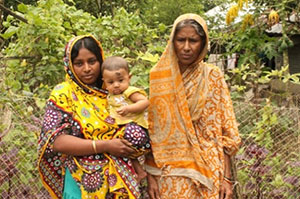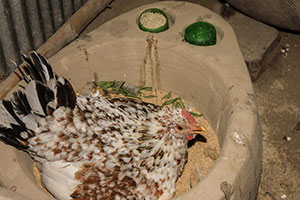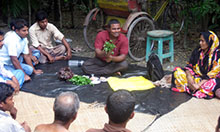How Mothers-in-Law are Helping Improve Nutrition in Bangladesh

Using a group-based learning model, Bangladesh’s Farmer Nutrition Schools (FNS) provide training that enhances access to diversified nutrient-rich vegetables, poultry, and fish for pregnant and lactating women. As students attend the school—which is supported by the U.S. Agency for International Development (USAID)—the encouragement of their family members is critical; it keeps participants engaged and helps them complete the nine-month curriculum. Family involvement also creates important synergies for the continuation of good nutrition and hygiene practices once the FNS has concluded.
Tayyiba Begum is an elderly woman in Burhanuddin upazila in Bhola district. Although she has resided at her home for many years, she did not utilize the land just outside her home. In 2014, SPRING established an FNS in Tayyiba’s community. Intrigued, she decided to attend the first session with her daughter-in-law. This curiosity soon transformed into knowledge and practice as the lessons continued.
“If our teachers back in school had not taught classes, we would not have learned anything at all. The point is, you can learn only if there is an opportunity to learn. And SPRING created that opportunity in our area. They introduced me to things I had not thought of before.”
The point is, you can learn only if there is an opportunity to learn. And SPRING created that opportunity in our area.
-Tayyiba Begum
Tayyiba is especially fond of the hajol (improved hatching pot for broody hens). She had heard about the hajol but did not understand how to make full use of it until FNS. Tayyiba credits the school with improving her knowledge of how to cultivate crops on her homestead and ensure proper nutrition for her daughter-in-law and grandchild. She is also thankful for the intangible benefits she has received. Attending FNS sessions and implementing the improved practices on their homestead has strengthened the bond between Tayyiba and her daughter-in-law, leading to enhanced harmony and stability in the family.
“I come along with my daughter-in-law to all the Farmer Nutrition School sessions. I haven’t missed a single session yet. The latest one was on fish culture.”
Mother-in-law support is evident across SPRING FNS communities. A little over 50 miles away in Dumki upazila in Patuakhali district, Shahida’s mother-in-law is excited about her jackfruit seeds. She has stored them in the seed preservation pots provided by SPRING. The national fruit of Bangladesh, jackfruits are highly nutritious, readily available in rural areas, and large enough to feed the entire family. The seeds can be roasted or mashed to go along with different dishes.

“I may not be rich, but I am happy with what I have. I can find vegetables anywhere outside my home. There’s no need to buy them. There’s no need to buy fish either. My daughter-in-law shares with me what she learns at the Farmer Nutrition School sessions. We also don’t have to worry about buying eggs frequently, thanks to the improved hajol. Tippy taps have made our lives a lot easier, too,” says Shahida’s mother-in-law. In addition to using the tippy tap for washing hands, she uses the water to perform ablution before offering her prayers.
SPRING/Bangladesh’s community-centered approach brings the importance of family members to the fore. Mothers-in-law are the unsung heroes in the success stories of Farmer Nutrition School participants – not only do they help their daughters-in-law embrace the lessons of FNS, but they also have become supporters of nutrition within their own homes and communities.
More than 100,000 women have benefited from 5,141 SPRING-implemented farmer nutrition schools across 40 upazilas in Barisal and Khulna divisions since May 2012. Each has gained insights into new ways to improve her own and her family members’ lives through simple but demonstrably better approaches to household agriculture, hygiene, and nutrition.
